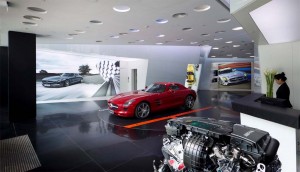The typical Chinese car dealership sells approximately 980 vehicles annually, substantially more than dealers in Europe and North America as China’s government actively promotes the creation of large dealer groups, according to a new report released Tuesday.
“The sales network in China is at a crossroads,” said Hamilton Gayden, managing director, Urban Science China, during a conference call from his office in Shanghai.
“Until this point, automotive manufacturers have been largely concerned with getting enough operators established to manage their sales. Today, with the sales pace calming, manufacturers are rethinking their retail footprints and being much more strategic, shifting from a network built simply on relationships to – for the first time – a true network plan driven by data,” Gayden said.
Gayden also noted the growing influence of dealer groups in China. Chinese dealer groups are already larger than those in the United States and represent a significant portion of the new vehicle sales revenue, as much as 14%, compared to the United States, in which the nation’s top 25 dealer groups accounted for approximately 10% of new vehicle sales last year.
(U.S. Auto Dealers heading for a record year. Click Herefor that story.)
In addition, China’s top 100 dealers experienced new vehicle sales growth of 41% over 2011, far exceeding the industry average of 2.45% , according to data collected by Detroit-based Urban Science, Urban Science, which has collected data on dealerships and franchises in the U.S. since 1990 and began studying the Chinese market two years ago.
Since China has nearly nonexistent franchise laws, the size of dealer groups gives them a significant voice in automotive manufacturers’ network planning and the establishment of sales territories, according to Urban Science.
Gayden said access to low-cost capital and strong relationships with local government will likely lead to a continued increase in concentration of franchises and vehicle sales among a relatively small number of dealer groups, an arrangement unique to China.
Urban Science found large-volume brands, including Sino-foreign joint ventures such as Shanghai VW, Shanghai GM, FAW VW and Guangzhou Honda, are all well established in China’s key regional markets with at least one dealership in all tier 1, 2 and 3 cities, which are concentrated along the coast, stretching from Dalian in the Liaoning province down to Guangzhou and Hong Kong, Gayden said.
Luxury franchises for brands such as Mercedes-Benz, Audi, BMW, Porsche and Lexus, are primarily concentrated in the area around Shanghai and Beijing where dealers of smaller, entry level cars have left the business in recent years because of limits on the number of license plates distributed annually, he said.
Struggling to contain rapid automotive growth straining the roadway infrastructure, a number of cities including Beijing have switched to a lottery system to reduce the number of new cars.

